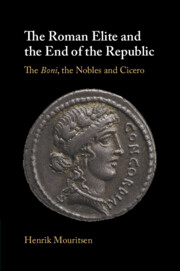Refine search
Actions for selected content:
9 results
3 - A Less Problematic Canon
-
- Book:
- Why the Ancient Greeks Matter
- Published online:
- 06 February 2025
- Print publication:
- 06 February 2025, pp 85-150
-
- Chapter
- Export citation
Chapter 1 - The Life of the Mind
- from Part I - Recreating the Stoic Past
-
- Book:
- Seneca
- Published online:
- 23 March 2023
- Print publication:
- 30 March 2023, pp 17-39
-
- Chapter
- Export citation
Chapter 6 - Otium and Voluptas: Catullus and Roman Epicureanism
- from Part I - Epicurus and Roman Identities
-
-
- Book:
- Epicurus in Rome
- Published online:
- 13 January 2023
- Print publication:
- 09 February 2023, pp 87-108
-
- Chapter
-
- You have access
- Open access
- HTML
- Export citation

The Roman Elite and the End of the Republic
- The Boni, the Nobles and Cicero
-
- Published online:
- 15 December 2022
- Print publication:
- 22 December 2022
10 - Imperial Villas
-
-
- Book:
- The Roman Emperor and his Court c. 30 BC–c. AD 300
- Published online:
- 29 September 2022
- Print publication:
- 20 October 2022, pp 239-266
-
- Chapter
- Export citation
9 - The Imperial Palaces on the Palatine Hill: Architecture as a Reflection of Social Practices and Imperial Authority
-
-
- Book:
- The Roman Emperor and his Court c. 30 BC–c. AD 300
- Published online:
- 29 September 2022
- Print publication:
- 20 October 2022, pp 204-238
-
- Chapter
- Export citation
Chapter 6 - Otium and Voluptas: Catullus and Roman Epicureanism
- from Part I - Epicurus and Roman Identities
-
-
- Book:
- Epicurus in Rome
- Published online:
- 13 January 2022
- Print publication:
- 27 January 2022, pp 87-108
-
- Chapter
- Export citation
5 - Cantare ad Lyram and Humanist Education
- from Part II - Cantare ad Lyram: The Humanist Tradition
-
- Book:
- Singing to the Lyre in Renaissance Italy
- Published online:
- 31 October 2019
- Print publication:
- 21 November 2019, pp 245-272
-
- Chapter
- Export citation
Part II - Cantare ad Lyram: The Humanist Tradition
-
- Book:
- Singing to the Lyre in Renaissance Italy
- Published online:
- 31 October 2019
- Print publication:
- 21 November 2019, pp 177-422
-
- Chapter
- Export citation
